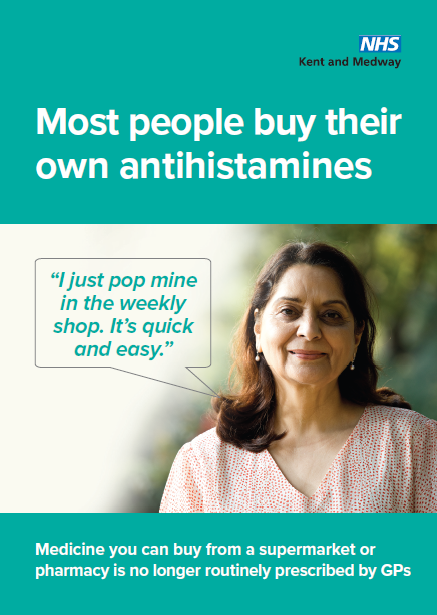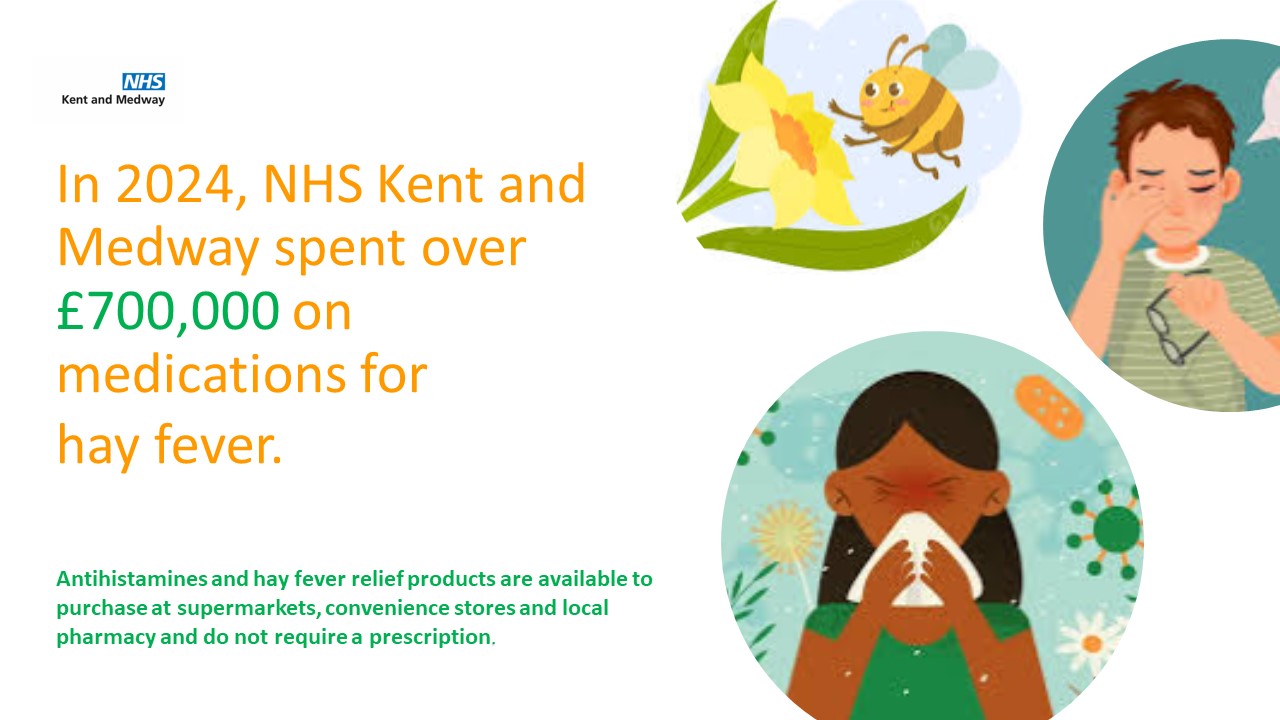We use cookies to help provide you with the best possible online experience.
By using this site, you agree that we may store and access cookies on your device. Cookie policy.
Cookie settings.
Functional Cookies
Functional Cookies are enabled by default at all times so that we can save your preferences for cookie settings and ensure site works and delivers best experience.
3rd Party Cookies
This website uses Google Analytics to collect anonymous information such as the number of visitors to the site, and the most popular pages.
Keeping this cookie enabled helps us to improve our website.


Position statement on the prescribing of medicines available to purchase over the counter for self-limiting and minor health conditions.
In March 2018, NHS England issued guidance for conditions for which over the counter items should not routinely be prescribed in primary care. To support the implementation of the guidance the NHS Kent and Medway Integrated Medicines Optimisation Committee has issued the following: Prescribing of items available over the counter (OTC) for self-care is NOT supported. This is because these conditions are:
• considered to be self-limiting and so do not need treatment as they will heal or be cured of their own accord.
• considered to lend itself to self-care i.e., the person does not normally need to seek medical advice and can manage the condition by purchasing OTC items directly. OTC items included:
• can be purchased over the counter, sometimes at a lower cost than that which would be incurred by the NHS.
• there is little evidence of clinical effectiveness. Additionally, the routine prescribing of vitamins, minerals and probiotics is also NOT supported due to limited robust evidence of clinical effectiveness
Inclusion Criteria
The following self-limiting, short-term illnesses and minor condition are included in NHS England guidance and should therefore not be issued with a prescription:
Acute Sore Throat
Infant Colic
Mouth ulcers
Conjunctivitis
Infrequent Constipation
Nappy Rash
Coughs and colds and nasal congestion
Infrequent Migraine
Oral Thrush
Cradle cap (seborrhoeic dermatitis – infants
Infrequent cold sores of the lip
Prevention of dental caries
Dandruff
Insect bites and stings
Probiotics
Diarrhoea (Adults)
Mild Acne
Ringworm/Athletes foot
Dry Eyes/Sore tired Eyes
Mild Cystitis
Sun Protection
Earwax
Mild Dry Skin/Sunburn
Teething/Mild toothache
Excessive sweating (Hyperhidrosis)
Mild contact dermatitis
Threadworms
Haemorrhoids
Mild to Moderate Hay fever/Allergic Rhinitis
Travel Sickness
Head Lice
Minor burns and scalds
Vitamins and minerals
Indigestion and Heartburn
Minor conditions associated with pain, discomfort and/fever. (e.g. aches and sprains, headache, period pain)
Warts and Verrucae
Exceptions to the guidance
This guidance applies to all patients, including those who would be exempt from paying prescription charges, unless they fall under certain exceptions.
There are certain scenarios where patients should continue to have their treatments prescribed and these are outlined below:
• Patients prescribed an OTC treatment for a long-term condition (e.g. regular pain relief for chronic arthritis or treatments for inflammatory bowel disease).
• For the treatment of more complex forms of minor illnesses (e.g. severe migraines that are unresponsive to over the counter medicines).
• For those patients that have symptoms that suggest the condition is not minor (i.e. those with red flag symptoms for example indigestion with very bad pain.)
• Treatment for complex patients (e.g., immunosuppressed patients).
• Patients prescribed OTC products to treat an adverse effect or symptom of a more complex illness and/or prescription only medications should continue to have these products prescribed on the NHS.
• Circumstances where the product licence does not allow the product to be sold over the counter to certain groups of patients. This may vary by medicine, but could include babies, children and/or women who are pregnant or breast-feeding. Community pharmacists will be aware of what these are and can advise accordingly.
• Patients with a minor condition suitable for self-care that has not responded sufficiently to treatment with an OTC product.
The list above is not exhaustive and requires prescribers to use their professional and clinical judgement as to whether prescribing is necessary.
In addition, more specific exceptions are included under the relevant item and/or condition in the NHS England guidelines.
Patient information
Information for patients is available at: Why can't I get a prescription for an over the counter medicine? - NHS (www.nhs.uk)
